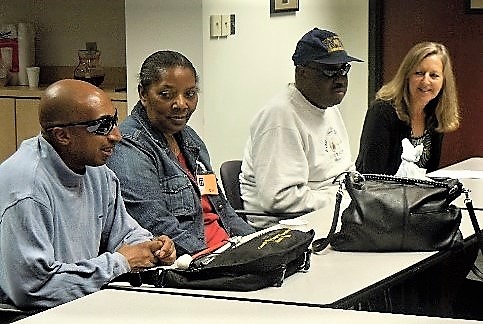Support Groups: Their Role in the Adjustment Process

If you are new to blindness or low vision, you may feel overwhelmed and need additional support. Participation in a support group may facilitate your adjustment to vision loss. Support groups bring people together who share a similar life challenge. Members learn to cope and feel less isolated as they connect with others who can relate to their situation. Friends and family members can also benefit from group attendance as they often need support. Members discuss their feelings, share experiences, and offer mutual support in a safe and confidential setting. They exchange ideas and information. The support group experience can help move members toward acceptance and adjustment to life with blindness or low vision.
Support groups are not the same as group therapy sessions. They may be peer-led by a layperson who is blind or low vision or someone interested in it, such as a family member. Sometimes, groups are offered through non-profit organizations, rehabilitation agencies, or advocacy organizations and may be led by professionals like vision rehabilitation therapists, social workers, or nurses.
Some support groups are educational, while others emphasize emotional support. The format may include topical discussions, guest speakers, hands-on workshops, and product demonstrations. Participants learn about resources and services in their area. Group members share advice and strategies for living with blindness or low vision. A support group can be a great place to socialize and build friendships.
Benefits of Participating in a Support Group
- Feeling less lonely and isolated
- Gaining a sense of empowerment, self-confidence, and control
- Learning to cope in healthy ways and adjust to vision changes
- Talking openly and honestly about your feelings
- Managing stress, depression, or anxiety
- Developing an understanding of what to expect with your situation
- Getting practical advice and helpful information
- Discovering resources, services, and devices that meet your needs
- Having the chance to help and support others
- Receiving inspiration and motivation from others’ stories
- Setting goals and preparing for the future with hope
Things to Consider When Selecting a Support Group
- Is it geared toward a specific condition or age group?
- Is the location convenient? Is there transportation assistance?
- Who is the facilitator or moderator?
- Is it confidential and comfortable?
- Does it have established ground rules?
- What is a typical meeting like?
- Is it free, and if not, what are the fees?
- Does it meet your needs?
Getting the Most Out of a Support Group
The right group will help you feel supported and understood. Find one that fits you and is comfortable. At first, you may be nervous to share your personal experiences and feelings. But in time, participating and contributing to the group will be beneficial. Mutual respect, courtesy, and confidentiality among group members ensure a safe and supportive environment.
Finding a Support Group
- You can use the APH ConnectCenter Directory of Services to find a support group in your area.
- Ask your local vision rehabilitation center or low vision clinic.
- Ask your state vocational rehabilitation agency or counselor.
- Ask your eye doctors.
- Consult the local library, senior services, and retirement centers.
- Consider online resources such as Facebook support groups.
- Contact associations, such as the American Council of the Blind, American Foundation for the Blind, National Federation of the Blind, the International Low Vision Support Group (ILVSG) network, Foundation Fighting Blindness, Macular Degeneration Support, American Diabetes Association, and the Glaucoma Foundation.
Starting a Group
When no group is available with which you are comfortable, the next option is to start a group. The Hadley Institute for the Blind and Visually Impaired is a distance education school that offers two free online courses on participating in and establishing a self-help group.
MD (Macular Degeneration) Support offers The International Low Vision Support Group network with a directory of groups that meet worldwide. It provides materials and resources for leaders, archived audio-visual presentations, and a Facilitator’s Kit to get a group started. In addition, it hosts TeleSupport, a year-round program of monthly group support sessions held over the telephone. It is designed for low-vision seniors anywhere in the US who have no access to the Internet or cannot attend a live support group.
Check out the Living Well with Low Vision Transportation Directory for transportation resources in your area.
Finally, meeting with others and learning how they overcome the daily challenges associated with significant vision changes can better prepare you for those challenges. Join a support group so you do not have to “go it” alone.
Contributed by Audrey Demmitt, R.N., VisionAware Support Group Advisor